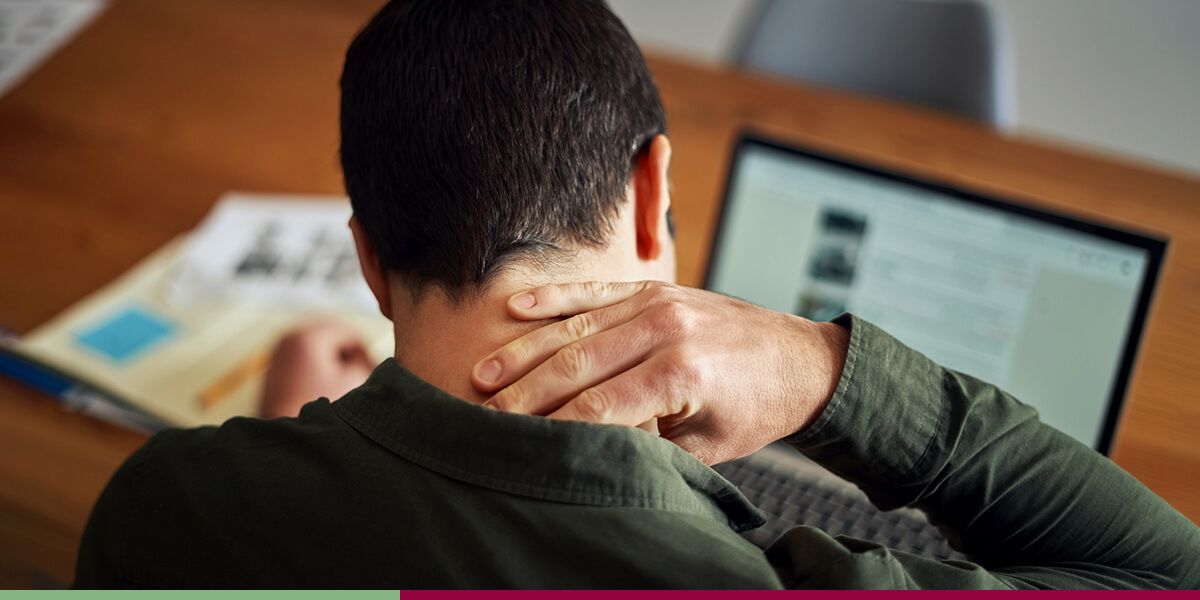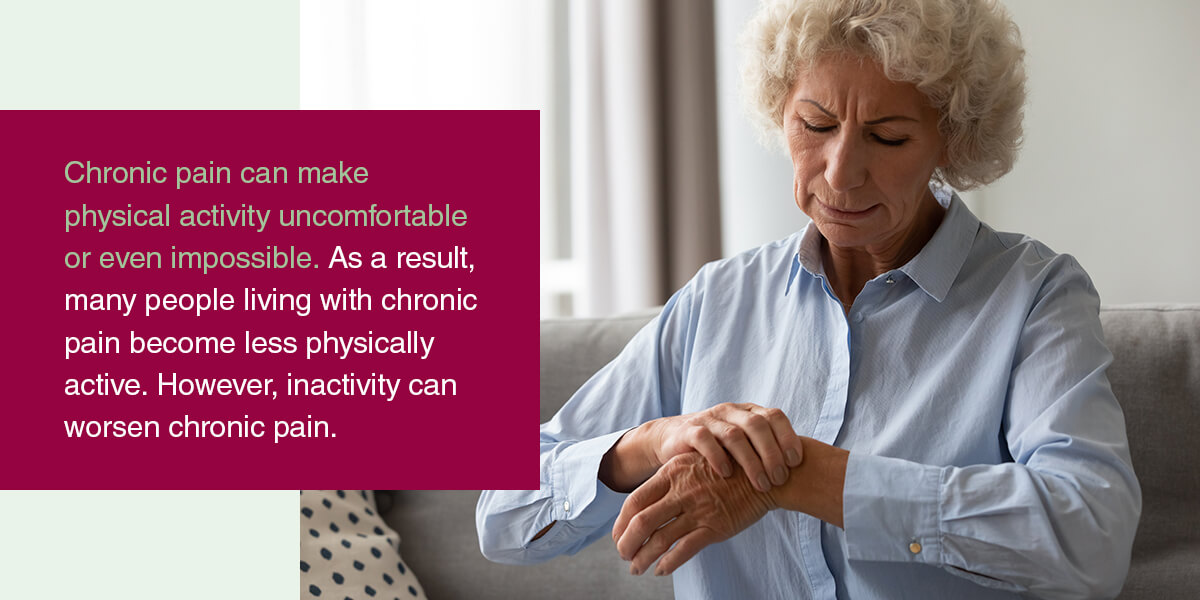How Chronic Pain Impacts Your Life

If you suffer from chronic pain, you know how debilitating it can be. You may have trouble working, eating, exercising or enjoying life as you once did. Indeed, the impact of chronic pain can cast a shadow on nearly every aspect of your life, affecting your physical, psychological and social well-being.
Fortunately, there are care options for those suffering from chronic pain. Read on to learn more about how chronic pain affects your life.
Table of Contents
What Is Chronic Pain?
Chronic pain lasts longer than three months, sometimes persisting for years. It can result from an injury or illness, occur alongside a chronic health condition or have no apparent cause. You may always feel chronic pain, or it may come and go.
Chronic pain differs from acute pain, which occurs temporarily when you hurt yourself. Acute pain typically doesn’t last long and subsides once your body heals from the injury. Chronic pain, however, persists long after you’ve recovered from an injury or illness. Research shows that chronic pain signals can get “wired into the nervous system” creating changes in the brain.
Chronic pain can occur anywhere in the body. Common types of chronic pain include the following:
- Back pain
- Neck pain
- Joint pain
- Migraines
- Cancer pain
- Fibromyalgia
- Pain from nerve damage
Pain can feel different for each person. Many describe chronic pain using the following terms:
- Throbbing
- Aching
- Burning
- Shooting
- Squeezing
- Stinging
Psychological Impacts of Chronic Pain
Living with persistent physical pain can take a toll on your psychological health. It can make partaking in daily activities much more difficult. You may have trouble with any or all of the following tasks:
- Traveling to and from work
- Concentrating on your responsibilities
- Cooking
- Eating
- Sleeping
- Cleaning
- Caring for children or other family members
- Caring for yourself
When chronic pain makes it challenging to carry out routine tasks and activities, you may begin to feel sad, worthless or hopeless. You likely miss the freedom and independence you enjoyed before you had chronic pain, and your new normal may be challenging to accept.
Chronic pain and mental health are significant considerations for those who suffer and their loved ones. Chronic pain can cause the following serious mental health effects:
- Stress: When chronic pain affects your daily life, you may become stressed about how you will cope. You may worry about how you will take care of your family, pay your bills or even if you will ever be pain-free again. Stress can also lead to anxiety and depression.
- Anxiety: Living with chronic pain can cause you to feel anxious about many aspects of your life. Anxiety is a constant, overwhelming sense of fear or worry. You may feel anxiety when you think about how you will maintain your relationships and finances when you’re always in pain. You may even become fearful of pain and avoid activities that could worsen your pain.
- Depression: If you have anxiety due to chronic pain, you’re also at risk of developing depression because the two often go hand-in-hand. However, chronic pain can lead to depression even if you don’t have anxiety. The sadness commonly felt by people with chronic pain can escalate into depression.
When chronic pain is severe enough to interfere with your daily life, you may get caught in a vicious cycle. You may become irritable, depressed and fixated on the pain. Depression can cause insomnia, which can cause fatigue, which often leads to more pain, irritability and depression. This is known as the terrible triad — a cycle of pain, sleeplessness and despair.
Physical Impacts of Chronic Pain
Chronic pain does more than just hurt — it can harm your physical health by taxing your muscles and joints and straining your heart.

Weak Muscles and Stiff Joints
Chronic pain can make physical activity uncomfortable or even impossible. As a result, many people living with chronic pain become less physically active. However, inactivity can worsen chronic pain.
As you become more sedentary, your muscles can weaken, and your joints can become stiff from underuse. The combination of weak muscles and stiff joints can significantly decrease your mobility and impact your quality of life.
One consequence of becoming weaker due to chronic pain is compensation, which occurs when other areas of your body try to do the work of the weakened muscles. The compensating body parts can become strained from too much work and may cause additional pain.
Cardiovascular Risks
People with chronic pain are at a greater risk of having a heart attack or stroke. One reason is that chronic pain can cause high blood pressure, a risk factor for cardiovascular events. When our bodies feel pain, our nervous systems try to eradicate it. But with chronic pain, the nervous system works constantly, and it can eventually lose its ability to regulate blood pressure.
Chronic pain can also put you at risk of cardiovascular events by triggering many factors that lead to poor heart health, such as stress, decreased physical activity, poor sleep and depression.
Social Impacts of Chronic Pain
Living with chronic pain can make it difficult to enjoy a fulfilling social life. It can impact social activities, relationships and interactions in the following ways:
- Social activities: Chronic pain can interfere with or even prevent you from participating in social activities. You may shy away from planning activities with friends and family because you’re unsure how you’ll feel when the time comes. Avoiding social activities can, in turn, lead to loneliness and feelings of isolation.
- Social relationships: Even if you can partake in social activities, your pain can still impact interpersonal relationships. Chronic pain can demand so much of your attention that you have little left to give to social connections. It can be difficult to focus on or express interest in others when coping with physical pain.
- Social interactions: Unpleasant emotions that often accompany chronic pain, like irritability and frustration, can tarnish social interactions. If chronic pain has you feeling down, your mood can influence that of the people around you, making interactions unpleasant. Alternatively, you may try to mask how you’re feeling around others to avoid spoiling their good time, which can be tiresome and disingenuous.
Contact Upper Cervical Chiropractic of Monmouth, LLC, for Chronic Pain Support
People who suffer from chronic pain may feel much more than physical discomfort. Living with chronic pain changes you, whether it makes daily activities difficult, affects your ability to make a living or strains your personal relationships.
If you or a loved one struggle with chronic pain, Upper Cervical Chiropractic of Monmouth, LLC, may be able to help you find relief from painful symptoms. Our highly experienced doctors use gentle techniques to deliver spinal adjustments — no cracking, twisting or popping involved. We also utilize SoftWave Therapy which has helped many people who suffer from chronic pain find relief. Reach out today to speak with our staff about a corrective care plan for your chronic pain.





